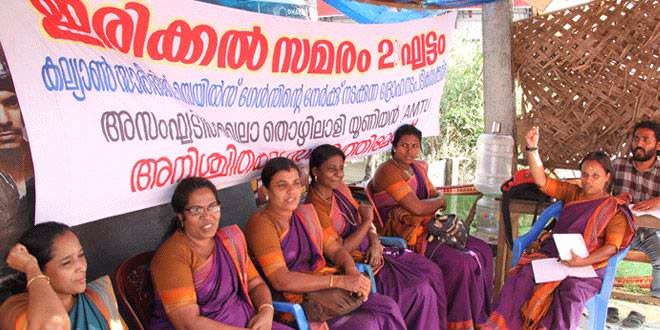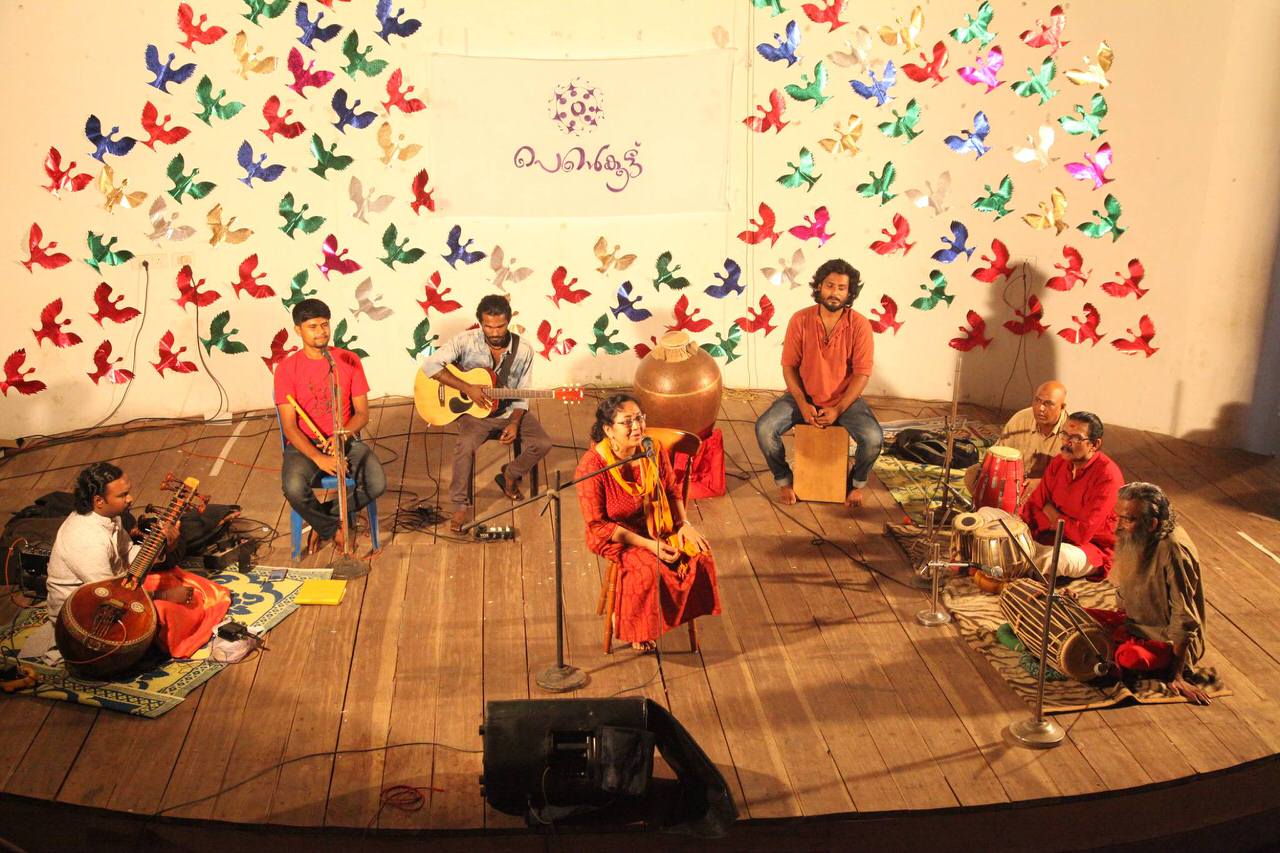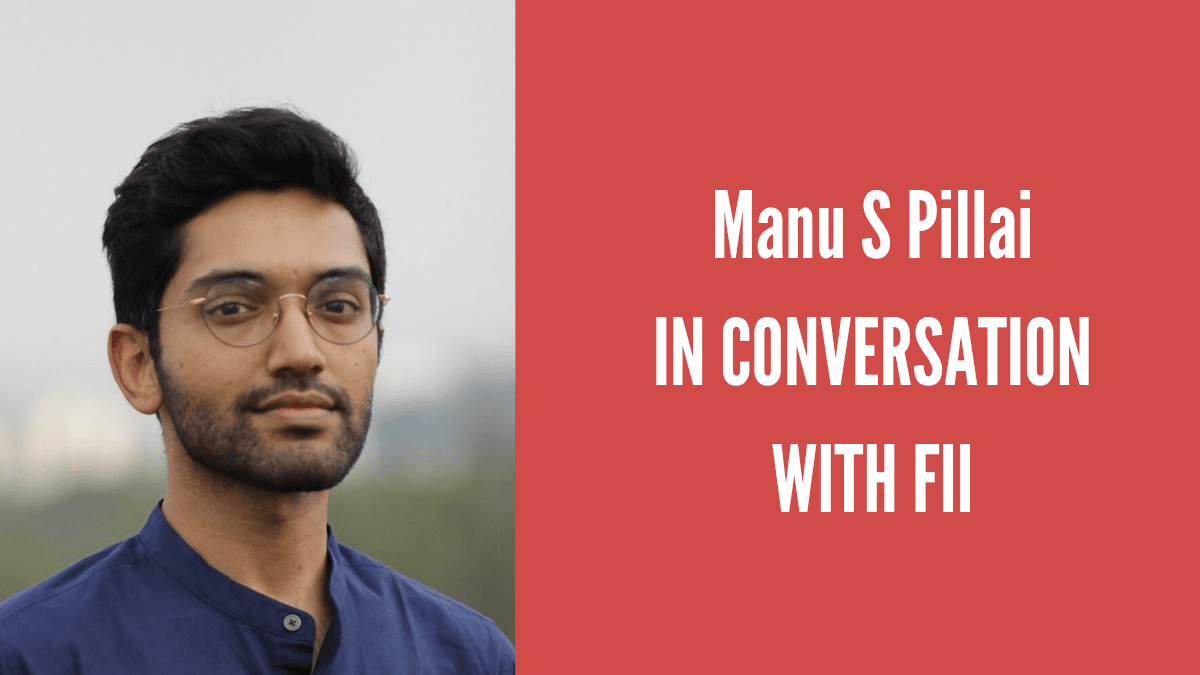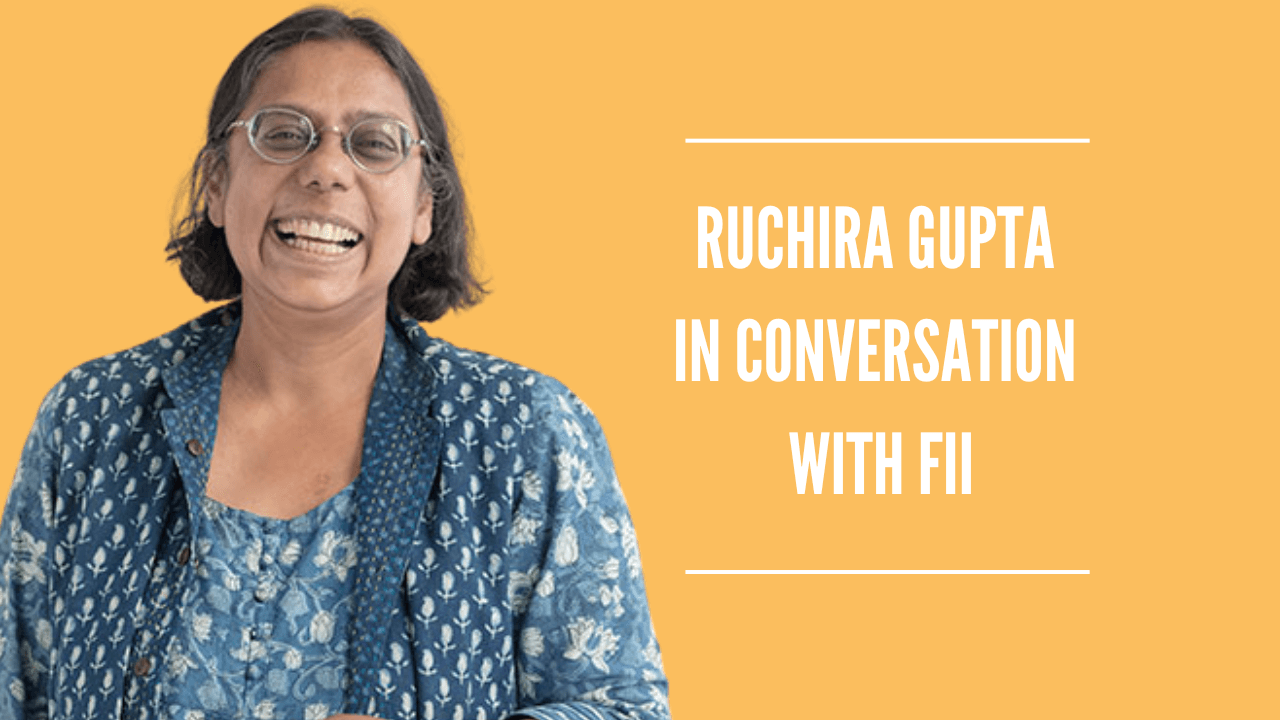
Penkoottu Media Collective
Penkoottu is a women’s led trade union and its short history is bright with many instances of successful struggle. The literal meaning of Penkoottu is “women for each other”. Recently, they have launched their YouTube channel, for which they are doing a fundraising campaign. On behalf of Feminism In India, I had the pleasure of asking them a few questions about their organization and their media initiative.
SM: ‘Penkoottu’ has registered Kerala’s first women-initiated Trade Union under the name Asanghaditha Meghala Thozhilali Union (AMTU). What was the incident that led to the realization that there is a need for a separate women’s trade union? What are the challenges that you have faced in your journey to get your organization officially registered?
Penkoottu: Penkoottu is a women’s collective which came together for the first time in 2009 to raise voices against the lack of usable toilets in the busiest commercial street, SM Street in Kozhikode, Kerala. For this cause, we went to all the established trade unions of the town, such as CITU, INTUC, AITUC, and in all of them, the decision makers were men who laughed about our cause or made vulgar comments, and wanted us to ‘get membership’ so that they could ‘study’ the issue.
For us, our cause was urgent and even fatal as many of our women had urinary issues and such. This was the first incident in which we realized that no established patriarchal party was going to help us, and even the political party which came to power with labour politics, never saw women labourers as a separate category exploited by both patriarchy and capitalism. P Viji, a tailor at SM Street and one who worked with a few feminist organizations in the past, is our major organiser and leader, as her experiences from different areas has enriched her political vision.
Later, when we dealt with many other labour issues of people working in unorganized sector (such as unregulated working hours, resistance in paying minimum wages, random dismissals etc), we found out that a registered trade union had many privileges and a bigger voice in these cases. From 2013, we have tried to get Asanghaditha Meghala Thozhilali Union (Kerala) registered and each time we were sent back stating tiny little technical details, as labor department of the town is well aware of our activities.
Even without getting technically registered, we have successfully agitated for many labor causes in Kozhikode and in Thrissur, of which Irikkal Samaram (agitation for the right to sit at workplace) in Kalyan Sarees in 2014, Coupon Mall samaram in 2013, agitation of community organisers of Kudumbasree for minimum wages in 2014 are worth mentioning.

A still from Irikkal Samaram. Image Credit: Youth Ki Awaaz
After much negotiation and intimidation, we were given registration in 2016, and now we are an organization which consists of laborers of many different sections such as launderers, street sellers, sales people, weighing and packing workers, nurses, tailors, sweepers etc. Although men have the right to membership of this organization, 75% of all executive membership and all major positions of this organization are reserved for women.
Penkoottu now is a political collective as well as network, with feminism as its basic ideology, and it is connected to many other organizations and collectives such as Bhoo Adhikara Samrakshana Samiti, Pembilai Orumai, etc., working on ‘politics of the marginalised’ in Kerala. AMTU (Kerala) is one organization working under the broader political understanding ‘Penkoottu’ which almost means ‘women for each other’, while ‘Penkoottu Media Collective’ is another.
SM: You have organised various campaigns and discussions around sexual harassment on streets and women laborer’s rights in the unorganized sector. How do you mobilize people for these events?
Penkoottu: We became involved in the sexual harassment on streets when some women working in sales in textile shops approached us. They usually start early and leave late, when usually very less women are present on the streets.
They get sexually harassed on the streets and sometimes physically harassed, and it had become unbearable to them. Some of us from Penkoottu decided to accompany them to major bus stands in the town, and we were able to catch hold of some of the regular harassers, and send a message to the public that such events wouldn’t get ignored in our town.
Some have taken the union’s membership by reading about us, about various agitations that we have organised, and some became members after we solved their problem. So far we have not yet done a membership drive, and we are thinking about one.
SM: What is the contribution of the Media in reporting about the various initiatives of Penkoottu?
Penkoottu: Some initiatives such as the toilet strike and the agitation for minimum wages of community organisers were well received and even celebrated by Kerala media while some others such as Irikkal Samaram which happened at Kalyan Sarees was given zero media attention as Kalyan is a big corporate sponsor here. We have an ambiguous relationship with present media.
SM: Recently, you have launched your own YouTube channel “Penkoottu media collective”. What is the vision behind launching a YouTube channel?
Penkoottu: The major aims of the YouTube channel are
- Political Education – The word or the idea ‘feminist’ is conceived as regressive in the mainstream culture in Kerala. It is mostly associated with upper-class housewives and ‘club culture’ in the mainstream cinema. Although we have many different feminist organisations working with different sections of women in the society, the young bail out of the word ‘feminist’. With this web channel, we want to introduce the cyber generation to indigenous feminisms and how as a political ideology it is important to women and other non-male people to a highly patriarchal Kerala.
- Bring Attention to Agitations of the Marginalised – Mainstream media is hardly interested in popular agitations which happen against caste, gender, labour, class and environmental discriminations, in land right movements and other marginalised agitations. The visibility is even lower if the aggressor is a big corporate, and we have experienced it in our own Irikkal Samaram. Presently at least about five major agitations are happening in Kerala which mainstream media happens to mention in one liners and we expect to cover these events with the seriousness they deserve.

Credits: YouTube
SM: The pilot episode of your first programme ‘Marivil Hostel’, a comedy-fiction series was published on 6th October, 2017. Tell us more about the series?
Penkoottu: We believe that feminism can be funny, and this is our attempt at ‘feminist laughter’ at regressive spaces such as women’s hostels. In Kerala, even working women’s hostels have very early curfew timings. In the popular culture, male friendships are often fetishised and celebrated.
Also the same culture portrays women who laugh and make others laugh as idiots or lesser. Here in this series we expect to show a glimpse of life in exclusive women spaces, the kind of friendships such spaces accommodate, how regressive are the rules there, how creatively women interpret them, how intelligent women are funny, so and so. Sure there are such things already done in Bollywood but for Kerala, this is entirely new. ‘Marivil’ is rainbow, it symbolises the many colours, and is also a little queer!
Hostel is a space where the inhabitants neither own the space nor make rules there. And when we look at women’s lives, most spaces – schools, colleges, households, are ‘hostels’ when you see it this way. So maybe after 5 episodes, we may move out of the hostel to other spaces women occupy.
SM: You are doing a fundraising campaign for your media platform. Tell us more about how are you going to use the collected fund?
Penkoottu: ‘Marivil Hostel’ is perhaps the most expensive production we have planned. Other series such as ‘What is feminism’ or the news stories based on agitations in and across Kerala are not expected to cost much. But now we are looking for an infrastructural fund to make basic arrangements to run the web channel such as an office space, a desktop system, a standard mobile phone which can be used for mojo, basic funding for making of our core series etc. The collected fund will be used very productively, and our accounts will be open to anyone who is interested.
Penkoottu is looking forward to crown fund this media initiative of theirs. They are really looking forward to get all the help from feminist spaces and institutions. People who are willing to contribute can get the details here.
Also Read: Kerala Registers It’s First All Women Trade Union
Featured Image Credit: Penkoottu Media Collective Facebook page
About the author(s)
Shinjinee grew up in the culturally diverse environment of Banasthali University, Rajasthan and since then has stayed in different cities of India. A graduate in English Literature from Banaras Hindu University, Shinjinee is pursuing her Master's in Women's Studies from TISS, Hyderabad and also holds a Diploma in Mass Communication from BHU.




